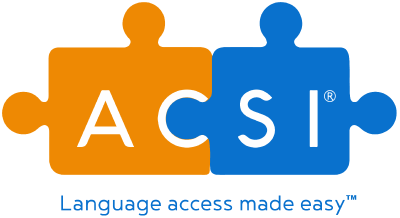Localization Matters
“The customer’s perception is your reality,” Kate Zabriskie, a well-known business trainer, comments. Localization is a perception that we at ACSI would like to turn into everyday reality. Companies are bound to see falling numbers if they do not participate in “localization,” wherein a company takes something global and creates a product characteristically local or focused on a specific place. As we speak, ACSI is growing to involve multiple services to further assist you. For example, website localization prides itself on accurate language focus. ACSI is able to achieve this by taking an existing website, and modifying it to reflect specific language and cultural preferences. We want these changes to be natural to our viewing customers—achievable through updated, localized images, content, and our overall site design.

ACSI highlights the importance of localization on our Language Access Maturity Model™ (LAMM), whose 9-levels explain how an organization integrates language services into it business, creating targets for improvement. Localization’s necessity begins to become important around Level 2 of our model, which we call, Recurring. In this level, your organization is just beginning to create processes for core localization tasks, realizing as well that you would benefit from a leader. Without formal processes, technology or staff in place, your organization may only be able to respond to opportunities on Level 1, or an ADHOC basis, which does not and cannot progress or grow your company in any way. Increase a client’s understanding of what it takes for the company to be productive, and then move them along each LAMM level toward greater and greater success.

Consumers can benefit from ACSI’s localized, language access through federally and/or locally translated documents, local-language technical support, retail translation and interpretation, website localization, and e-learning, among others. We want to make everyone feel heard, and perhaps even personally represented. Local companies are more likely to buy materials and documents that have been translated. This approach creates a system of language-trust and understanding, that is important to our ACSI team. Briefly, here are some positive localization functions that help to increase sales:
Marketing—if the buyer understands the merchandise, he/she is more likely to buy
Documentation—a translation increase (e.g. medical) yields fuller buying potential
Administration—without language instruction, the more skills IT staff must possess
Support—adapting support documents (e.g. instruction manuals)

Now, let’s pull back a bit to briefly think globally—it seems counterintuitive that “local-ization” would be integral in a successful international market, but what this phenomenon allows consumers and buyers are more and more choices. Translating the words is where localization begins. Almost 90% of major global companies agree to disclose that they are localization-pursuant, backs up the simple, but very important phrase, “Happy customer = Business growth.”

